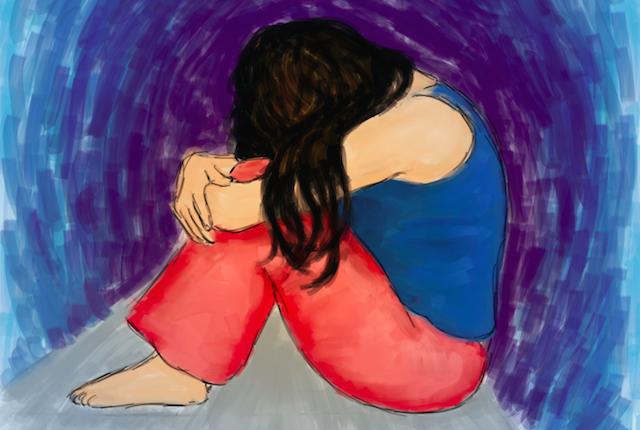
“It’s okay to not be okay all the time.” ~Unknown
I never thought of myself as an anxious person.
But here I was again, staring at a computer screen in my office, so stressed I could barely type. I’d been throwing myself into work and I had crashed—hard.
And this wasn’t the first time.
Unfortunately, our mental image of who we think we are and who we actually are don’t always match up. But part of being human is that we learn to live with that, we embrace the struggle, and we grow.
Over the last five years I’ve had a number periods of high anxiety, often triggered by work-related stress. In that time I’ve realized that my beliefs about anxiety were unhelpful, and they often worsened the experience.
When I was able to let go of the firm grip I had on these ideas, I found that when anxiety came to visit, it didn’t stay around as long as it used to.
Here are five beliefs about anxiety that can make you even more anxious. If you recognize them in yourself, I hope you can let them go when they arise.
1. It’s not normal (or okay) to have anxiety.
When you first start to notice your anxiety, you might think it’s not normal. The feelings in your body will be so intense that when you look around at other people, who on the surface look so calm, you won’t be able to believe that what’s happening to you might happening to them.
But I want you to know something. You are not alone.
Though everyone’s experience will be different, there are dozens of people you’ll come into contact with daily who have probably had similar feelings.
That guy who gave you your coffee this morning, he had a panic attack before work. The girl next to you at the bus stop, she’s trying to calm herself down right now. The boss who yelled at your coworker an hour ago, he’s anxious that his own boss is breathing down his neck.
Anxiety is common.
Holding onto the (false) belief that what’re you’re experiencing isn’t normal only intensifies the problem by making you feel separate from everyone else around you. It keeps you in your head where the question “Why is this happening to me?” may circle round and round without ever finding a good enough answer.
2. I need to get over my anxiety in X weeks, months, years.
Putting strict deadlines on when you want to completely rid yourself of anxiety is never useful. But I used to do this all the time.
The role that anxiety is going to play in your life isn’t predictable—you just can’t know. Telling yourself that you must overcome it in a certain amount of time is just going to feed it. Once you can truly learn to accept that you don’t know when or for how long it will come to visit, you’ll notice it does so a lot less often!
3. I can use my anxiety as a motivational tool.
One common way we often justify our anxiety is through the cliché “I work best under pressure,” but what we’re usually doing is placing an unnecessary amount of stress on our bodies and brains.
In the long term, this can leave us drained of the necessary energy to prevent and ward off anxious thoughts. When you experience stress, don’t focus on doing more. Just ride it out, let it pass, and try to be productive from a place of relative calm.
4. The magic bullet cure for my anxiety is out there somewhere.
Overcoming anxiety is a process, and holding onto the idea that you’re just one more book, course, or technique away from the ultimate cure will inevitably lead to disappointment, and typically more anxiety.
Take it day by day and relish in the small victories, and over time you’ll make progressive but sustainable changes in the way you handle your nerves.
5. Anxiety is all in my head.
This is completely false, and an unhelpful way to look at anxiety. It’s an issue with your nervous system, so it’s just as much in your body as it is in your head.
Trying to think or rationalize your way out of panic can often be a losing battle. By seeing the mind and body as connected, and both as home to your anxiety, you can develop more skillful control over your thoughts and feelings and not get caught up in a maze of worry.
If you don’t already have a movement related practice, something like yoga, Qigong or Tai Chi can be really useful for improving your ability to calm your body.
I’m not yet completely anxiety free, but every year I cope with it better and better.
Make small steps every day, congratulate yourself on the little wins, and remember that you are not alone!
About Benjamin Fishel
Ben Fishel is a counsellor and psychotherapist. He has a background in neuroscience, counselling and existential psychotherapy and is on a mission to help people improve their mental health with cognitive science and spirituality. Ben offers a telehealth counseling service worldwide (with the exception of Canada & the U.S.). Don’t forget to follow him on Facebook for more of his essays!













 Though I run this site, it is not mine. It's ours. It's not about me. It's about us. Your stories and your wisdom are just as meaningful as mine.
Though I run this site, it is not mine. It's ours. It's not about me. It's about us. Your stories and your wisdom are just as meaningful as mine.
Anxiety is a learned habitual reaction. We are not born anxious, we develop these habitual conditioned reactions, usually during the formative years of childhood. Then we reinforce them through layers and layers of secondary reactivity to the anxiety- fear of the anxiety, aversion, avoidance and identification with the anxiety. These secondary reaction feed the anxiety like feeding a fire with wood. From my experience as both a recovered anxiety sufferer and now teacher and therapist, probably the best approach for changing the anxiety habit is mindfulness meditation. Not meditating on the breath as is commonly taught, but meditating on the anxiety itself. The more consciousness you bring to the reactive thoughts the more you can break the habit of feeding the fire; the more mindful and compassionate you become to the anxiety itself, the faster it heals. The fact is, habits can be changed, and that includes anxiety and the more intense panic attacks that affect so many of us.
The Boulder Center for Online Mindfulness Therapy
Now Mr Strong if you could only explain that again in a way that a moron like me could understand, I might be able to appreciate what you mean by all that gobbledygook. This is a frustration for me when it comes to my anxiety that I think should have been on this list, doctors and other so called intelligent people who claim to be helping me, when all they do is say stuff that I don’t understand about my anxiety and then send me home completely baffled and charge me 50 dollars. I ask them to explain it better and they don’t. I would tell them it only adds to my anxiety and they would always say “I’m the doctor, I know what i’m talking about even if you don’t” and they would expect me to just trust them, which is absurd. I’m not having a go at you sir, I just would like you to rephrase all that so I can understand. Thanks.
Hi Shaun,
If it helps at all a book I used to help ‘Cure’ my anxiety is called.. Dare. you can get it on amazon. I too had the same issues you mention above however the Dare book explains pretty much everything and helps you with techniques to some what beat anxiety I personally found this book to be amazing and I 8 months ago could not get put of bed due to it, but now I am out and about and feel like nothing can stop me. I hope you find similar results if you were to purchase the book.
I confess I’m a tad skeptical with books, but I am learning to give things a chance before writing it off. This site has helped in that regard. I’ll take a look at it. Is this Dare book available as an Ebook?
Hi I think it is yes, but it does cost:
https://www.amazon.co.uk/Dare-Anxiety-Panic-Attacks-Audios-ebook/dp/B0158S7E1G/ref=sr_1_1?ie=UTF8&qid=1491925815&sr=8-1&keywords=dare
Worth every penny in my eyes.
I’ll look into it Daryl. Thanks.
Absolutely love this book! I actually have the app on my phone as well. Very reassuring & relatable!!
Here is a simple technique for you to try. When you become aware of an anxiety thought, say “I see you. Welcome!” Then visualize the thought as a grain of sand and put it on the ground. Do this over and over with all anxiety thoughts. Notice and report back on the reduction in anxiety that you notice after practice citing this for a day.
Boulder Center for Online Mindfulness Therapy
So visualize my anxiety and fear as sand in my hand and pour it on the ground? Ok, that sounds easy enough for me. Do I say the words “I see you, welcome” in my head or out loud?
Usually you say that in your head. The purpose is to develop an attitude of friendliness toward the thoughts and the emotion. This makes you stronger. Aversion is a real problem for anxiety sufferers because it generates fear and makes you smaller (emotional contraction). Let me know how this works for you (and any other readers are also invited to participate in this simple mindfulness experiment and leave their comments).
Will do, Mr Strong. Thank you.
I find this to be very true and wish I could have learned about it sooner. I believe so many of my fears and anxietal reactions are due to the amount of free and anxiety my dad lives in. He always seemed to be such a powerful force in my eyes, so I recognized the shame, fear, vulnerability, and anxiety until I became aware of it in myself. Now, from what I have learned through many books, blogs, and a couple courses that he lives in an incredible amount of fear and that has affected me and how I react to things tremendously. Undoing 30 years of this reactivity is difficult, but once we have the knowledge that it can be done makes it so much easier! Thank you Benjamin for the post and thank you Peter for sharing!!
So insightful. Anxiety is something we deal with in our everyday lives it is up to us to learn how to control and cope with it. Thanks for the share!
Thankyou for wonderful article
great tips! thank you for sharing!